In a speech to the Higher Education Funding Council for England’s annual conference, the universities and science minister said he was working with the Department for Education on the plan.
However, he said any contact with pupils – which would likely be done through headteachers – would not mention specific universities or mission groups.
“I am now working with the DfE to see whether we can better target information at pupils from poorer backgrounds who have done well at their GCSEs,” he told the conference today at Imperial College London.
“This is tricky terrain. With today’s sensitivities about data protection, it is hard for ministers to drop a line directly to Joe or Gemma congratulating them on their exam results and urging them to think about going to university. But perhaps we can write to the headteachers with a message to pass on.
“We are not going to start telling people where to apply. But I want to work with you so that we can go further in ensuring that students know where to look for the information that will help them make the right decision for them - about the range of universities and the support available.”
He added that the Universities UK chief executive, Nicola Dandridge, had agreed to work with the government on what such information would say, while a draft of the letter to pupils was planned by the summer.
Mr Willetts also said that unfilled student places at universities will be moved to institutions “with stronger recruitment patterns” as part of further plans to liberalise the market for students in England.
He said Hefce would “soon be consulting” on the measures, with a view to introducing some changes in 2014-15.
Mr Willetts said the proposals would add “further flexibility” to the system and help universities that cannot benefit from the open competition for students with top A-level grades.
“For 2014-15, we will continue to increase student choice and to enable popular institutions to expand,” he told the conference.
“We want greater freedoms and flexibilities for all institutions, not just those with high-tariff students. 2014-15 will be a step towards that.”
He added: “Where student demand is low and institutions significantly under-recruit then unfilled places will be moved to those with stronger recruitment patterns.
“This will give greater flexibility to all institutions. It will remove some of the fear of penalties for over-recruitment and provide a sustainable means of matching supply with demand.”
Meanwhile, Mr Willetts also used the speech to praise Sir Alan Langlands, who will step down as chief executive of Hefce later this year to become the University of Leeds vice-chancellor.
“He has been a rock of stability amidst so much change. I am sorry he is leaving…but I quite understand the reasons for his moving…Alan has been an absolutely first-class head of Hefce,” he said.




